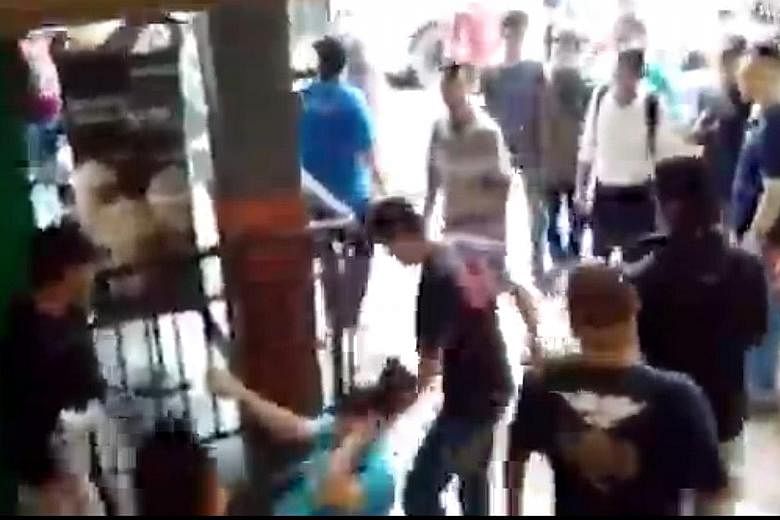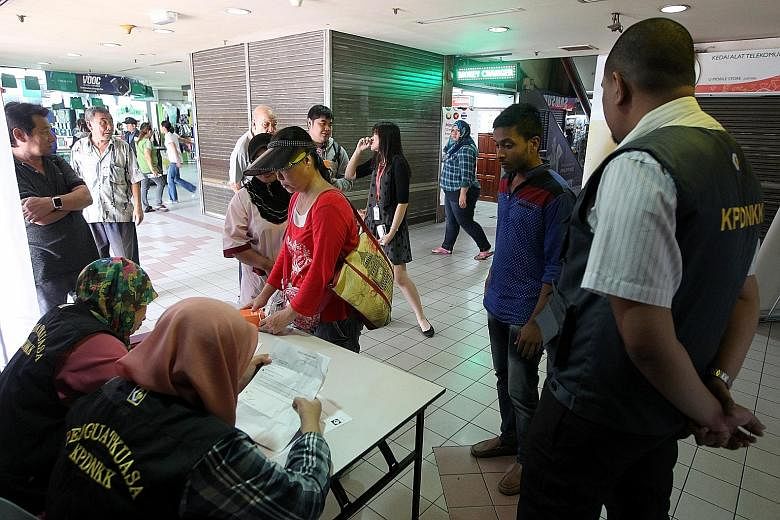One of Kuala Lumpur's older malls, Kota Raya, is seeing few customers this week, a change from the usual throng of migrant workers who fill the place. At Mara Digital Mall with its Malay-only traders 2km away, the place is just as deserted.
These two venues are linked by recent violent mall brawls - Kota Raya became empty after a fight, and the Mara mall was born following an earlier dispute.
The fights between Malay men using sticks and helmets and Chinese phone sellers have become the latest symbol of Malaysia's fractious society. The matter is made worse by activists turning disputes over cellphones into a race issue, and fuelled by the authorities' lack of action and seemingly slow intervention from top politicians.
"There is an undercurrent of distrust between races. Put that together with a slowing economy, a weaker ruling government, it all adds to a layer of insecurity," said Mr Ibrahim Suffian, director of independent pollster Merdeka Centre.
In July, a group of several hundred descended upon popular gadget mall Low Yat Plaza in a gathering that nearly turned into a riot against Chinese traders, after social media rumours of a Malay man being sold a counterfeit phone.
And on Sunday, some 20 Malay men attacked cellphone sellers in Kota Raya after allegations that a store had cheated a Malay customer.
The incident at Low Yat Plaza turned out to be a case of thievery, with friends of the accused rallying others. In Kota Raya, the store that was attacked has been reported to have cheated many customers, but the brawl spiked communal tensions anew. Both incidents spiralled into violence after activists used racially charged language.
Before the Kota Raya incident on Sunday, Malay rights activist Mohd Ali Baharom told reporters that if cheating cases were to occur again, "the Malays will rise and oppose Chinese traders in Malaysia".
Mr Mohd Ali, a former soldier, had also given a racially charged speech in July outside Low Yat Plaza. He was charged then with sedition, but the charges were dropped a day after the so-called Red Shirt rally to defend Malay rights in September in which he was one of the leaders.
Following the Kota Raya brawl, Mr Mohd Ali was arrested on Tuesday but released a day later on bail.
Analysts say the racially charged incidents are symptomatic of Malaysia today, as the multiracial country becomes more divided and the government is seen as slow to react. "There is a view that those in power can't punish those whom they share a common belief with, those speaking up for Malays," said Mr Ibrahim.
The fractious society was partly caused by a government plan to grow a Malay middle class following race riots in 1969. The bumiputera policy of promoting Malay rights grew the pool of educated Malays and Malay businessmen. But analysts say the policy also created a culture of entitlement among some Malays.
After the Low Yat incident, Umno leader and Cabinet minister Ismail Sabri Yaakob started Mara Digital Mall, a Malay-traders only information technology mall. It opened earlier this month and occupies a floor in a government-owned building. Mr Ismail now wants to set up similar IT malls nationwide using Mara, a government agency for helping bumiputera businesses.
Those who set up shop in the Mara mall are given rent-free kiosks for six months, followed by below- market-rate rents thereafter. On the ground, there are worries that small business disputes are twisted and infused with a racial slant.
"It's not about race," said jeweller May Choo, who operates in Kota Raya, referring to the cellphone fracas on Sunday. "It's unfortunate that some people are using the race card and painting things badly."
Deputy Prime Minister Ahmad Zahid Hamidi said on Wednesday: "If there is a misunderstanding or unhappiness that arises between them, then it should be dealt with as it is and nothing else. Racial or religious factors should not be dragged in."
A carpark attendant was jailed for four days for the Kota Raya brawl and fined RM1,800 (S$600) and two others are being held.
Other Malay groups have now jumped in and are blaming Chinese traders for "cheating". They include Islamic group Isma and the Muslim Consumers Association. This could worsen the multi-ethnic cracks, analysts say. "Of course, if left unchecked it would certainly escalate," said Dr Oh Ei Sun, senior fellow at S. Rajaratnam School of International Studies in Singapore.
There are worries that the more aggressive Malay voices are becoming louder, as mainstream Umno leaders keep to the sidelines.
"Whenever there's a power struggle at the highest level, you'll see racial politics being played," said Dr Oh. "It distracts people from the political troubles at the top."


